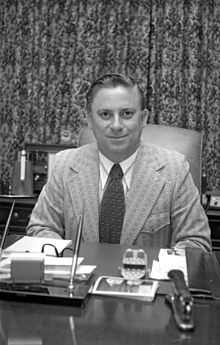Louie L. Wainwright

Louie L. Wainwright (born September 11, 1923) was Secretary of the Florida Division of Corrections from 1962 to 1987, more than a quarter of a century.[1] He is most famous for being the named respondent in two U.S. Supreme Court cases: Gideon v. Wainwright in which indigents are guaranteed an attorney, and Ford v. Wainwright, in which the Court approved the common law rule prohibiting the execution of the insane. Time Magazine called the Gideon decision one of the ten most important legal events of the 1960s.[2] He also appeared as the respondent in a number of habeas corpus petitions that reached the Supreme Court level during his long tenure in office, making "Wainwright" one of the most familiar names to students of habeas corpus law.
Wainwright received a masters degree in criminal justice from Nova Southeastern University, later serving as a temporary faculty member there. He was then acknowledged as Dean of American Correctional Administrators. Wainwright was appointed as Secretary of the Florida Division of Corrections by Cecil Farris Bryant (Florida Governor at that time) in 1962, replacing H. G. Cochran and remained in the position until 1987, when Richard L. Dugger assumed the role.[1]
Wainwright served under six governors: Bryant, Haydon Burns, Claude Roy Kirk, Jr., Reubin O'Donovan Askew, Bob Graham and Wayne Mixson.
He has received the American Correctional Association's highest tribute, the E.R. Cass Award for outstanding service and his efforts in support of accreditation in Florida and nationwide earned him the 1986 Accreditation Achievement Award from the Commission of Accreditation for Corrections. Wainwright was appointed to the Corrections Foundation Board in 2001 and re-appointed as President in 2003, 2004 and 2005.
He also served as President of the Florida Peace Officer's Association from 1965–1966, where he is still a prominent and respected member.
He once was the Superintendent of Avon Park Correctional Institution. His post, Secretary of the Florida Division of Corrections, replaced the post of Director of the Division of Corrections.
See also
Footnotes
- ↑ 1.0 1.1 "Florida Department of Corrections Timeline - 1962". Florida Department of Corrections. Retrieved 2007-10-06.
- ↑ "Florida Department of Corrections Timeline - 196-1965". Florida Department of Corrections. Retrieved 2007-10-06.